40 citations,
June 2021 in “Clinical, cosmetic and investigational dermatology” JAK inhibitors show promise in effectively treating hair loss from alopecia areata.
 3 citations,
May 2018 in “InTech eBooks”
3 citations,
May 2018 in “InTech eBooks” Animal models, especially mice, are essential for advancing hair loss research and treatment.
 8 citations,
June 2019 in “Journal of Ginseng Research”
8 citations,
June 2019 in “Journal of Ginseng Research” Gintonin-enriched fraction promotes hair growth and could be a potential alopecia treatment.
 6 citations,
June 2019 in “Skin Research and Technology”
6 citations,
June 2019 in “Skin Research and Technology” Finasteride works for hair loss by maintaining existing hair follicles, not reversing miniaturization.
 15 citations,
May 2017 in “Journal of Dermatological Treatment”
15 citations,
May 2017 in “Journal of Dermatological Treatment” Latanoprost works better for hair growth, and combining it with betamethasone valerate is most effective.
 3 citations,
May 2023 in “International Journal of Molecular Sciences”
3 citations,
May 2023 in “International Journal of Molecular Sciences” A new treatment using nanoparticles can effectively prevent and reduce hair loss caused by chemotherapy.
 55 citations,
October 2019 in “Dermatology and therapy”
55 citations,
October 2019 in “Dermatology and therapy” Drugs targeting the JAK/STAT pathway can improve atopic dermatitis but vary in effectiveness for vitiligo and alopecia areata, with generally mild safety concerns.
 25 citations,
January 2013 in “Journal of Industrial and Engineering Chemistry”
25 citations,
January 2013 in “Journal of Industrial and Engineering Chemistry” Some herbal extracts, especially when used in cubosomal suspensions, were as effective as Minoxidil in promoting hair growth.
 7 citations,
January 2017 in “Dermatology”
7 citations,
January 2017 in “Dermatology” People who get alopecia areata after age 50 usually have mild symptoms, high chances of hair regrowth, and often have other health conditions.
 4 citations,
January 2022 in “Drug design, development and therapy”
4 citations,
January 2022 in “Drug design, development and therapy” Intramuscular corticosteroids are effective and safe for severe alopecia areata, with most patients regrowing hair, but nearly half may relapse.
 40 citations,
August 2022 in “Frontiers in immunology”
40 citations,
August 2022 in “Frontiers in immunology” Blocking JAK/STAT pathways can help treat hair loss from alopecia areata.
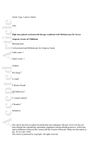 15 citations,
May 2017 in “JEADV. Journal of the European Academy of Dermatology and Venereology/Journal of the European Academy of Dermatology and Venereology”
15 citations,
May 2017 in “JEADV. Journal of the European Academy of Dermatology and Venereology/Journal of the European Academy of Dermatology and Venereology” High-dose corticosteroids and methotrexate had a modest effect on severe childhood alopecia, but side effects and relapse were concerns.
 54 citations,
September 2019 in “Journal of the European Academy of Dermatology and Venereology”
54 citations,
September 2019 in “Journal of the European Academy of Dermatology and Venereology” Tofacitinib is somewhat effective for alopecia areata, but more research is needed on its safety and long-term effects.
 1 citations,
January 2022 in “The Egyptian Journal of Hospital Medicine ”
1 citations,
January 2022 in “The Egyptian Journal of Hospital Medicine ” Cryotherapy and steroid injections are similarly effective and safe for treating alopecia areata.
 6 citations,
November 2022 in “Journal of autoimmunity”
6 citations,
November 2022 in “Journal of autoimmunity” JAK inhibitors like tofacitinib may effectively treat Alopecia Areata.
 11 citations,
January 2018 in “RSC Advances”
11 citations,
January 2018 in “RSC Advances” Cedrol cream is more effective and safe for promoting hair growth than traditional treatments.
 58 citations,
February 2016 in “Scientific reports”
58 citations,
February 2016 in “Scientific reports” Blocking BACE1 and BACE2 enzymes causes hair color loss in mice.
 20 citations,
March 2019 in “Journal of The European Academy of Dermatology and Venereology”
20 citations,
March 2019 in “Journal of The European Academy of Dermatology and Venereology” Minoxidil effectively and safely treats patchy hair loss, but more research needed.
 1 citations,
April 2019 in “Acta Medica Philippina”
1 citations,
April 2019 in “Acta Medica Philippina” Azathioprine may help treat severe alopecia areata, but more research is needed.
19 citations,
July 2019 in “Journal of Cosmetic Dermatology” A new tool can predict hair regrowth in patchy alopecia areata patients.
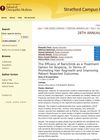
Baricitinib effectively promotes hair regrowth in severe alopecia with minimal side effects.
January 2016 in “Hair therapy & transplantation” Hair UpTM effectively and safely promotes hair regrowth, especially in minors.
 April 2021 in “Research Square (Research Square)”
April 2021 in “Research Square (Research Square)” Achieving 80% or more scalp hair regrowth is considered a successful treatment for significant hair loss.
 May 2023 in “JAAD international”
May 2023 in “JAAD international” Minoxidil-dutasteride tattooing can potentially help regrow hair, especially in men who already have some thin hair.
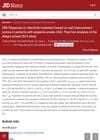 April 2023 in “The journal of investigative dermatology/Journal of investigative dermatology”
April 2023 in “The journal of investigative dermatology/Journal of investigative dermatology” Ritlecitinib significantly improves scalp hair regrowth in alopecia areata patients over time.
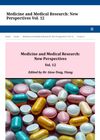
Mesenchymal Stem Cell Conditioned Media can significantly regrow hair in alopecia areata patients.
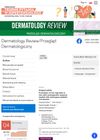 January 2022 in “Przegla̧d dermatologiczny”
January 2022 in “Przegla̧d dermatologiczny” Platelet-rich plasma treatment can effectively promote hair regrowth in men with androgenetic alopecia without major side effects.
 October 2024 in “Frontiers in Pharmacology”
October 2024 in “Frontiers in Pharmacology” The correction does not change the conclusion that 2-deoxy-D-ribose helps hair regrowth.
 9 citations,
December 2020 in “Journal of The American Academy of Dermatology”
9 citations,
December 2020 in “Journal of The American Academy of Dermatology” Platelet-rich plasma may help restore immune balance in bald patches, but its effectiveness in treating hair loss is limited.

Baricitinib therapy helped many patients with severe alopecia regrow hair after 52 weeks.


























